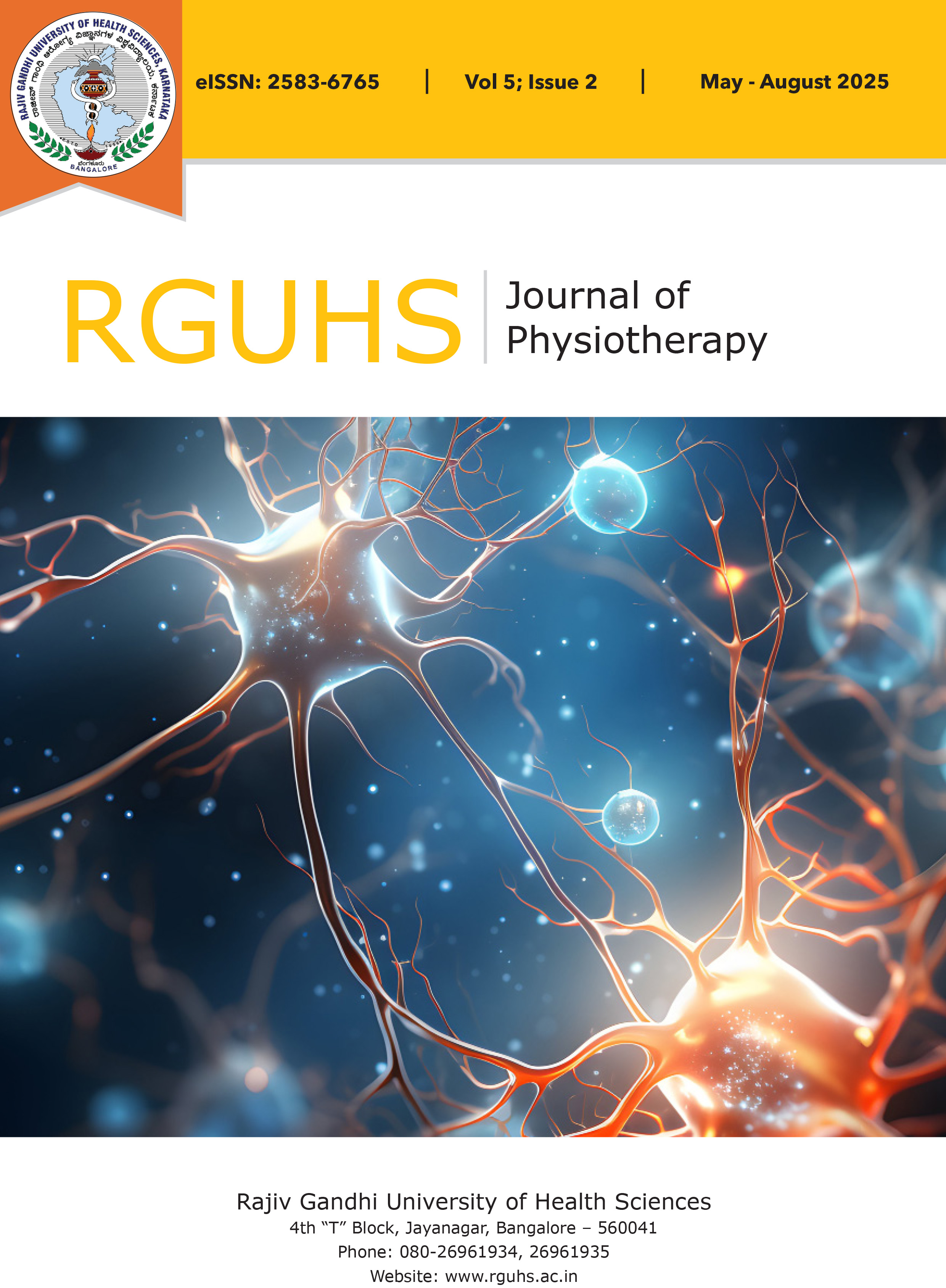
RGUHS Nat. J. Pub. Heal. Sci Vol No: 5 Issue No: 2 eISSN:
Dear Authors,
We invite you to watch this comprehensive video guide on the process of submitting your article online. This video will provide you with step-by-step instructions to ensure a smooth and successful submission.
Thank you for your attention and cooperation.
1PT, PhD, Principal, JSS College of Physiotherapy, Mysore.

Abstract
None
Keywords
Downloads
-
1FullTextPDF
Article
This editorial is aimed at describing the role of peer support in improving outcomes with therapeutic interventions, and makes recommendations for future research in this field.
Rehabilitation is a lifelong endeavour and not a cure. It is not hierarchical; it is ever changing, and continuously brings successes and challenges. It is a journey taken with a whole eco system of family, friends, healthcare professionals and society at large. Outcomes measured as quality of life and empowerment is ultimately about creating and living a meaningful life in a community of choice. In this journey, connecting with others who have a similar history or experience can be empowering, particularly if the history relates to illness, dysfunction, or trauma. By connecting with a community of similar individuals, burdens are shared, experiences can be given a status of normal, solutions can be shared, and hopes of a bright future are born, decreasing the feeling of loneliness and helplessness. Formalised peer support can assist in many ways including seeking solutions, sharing experiences and altogether as a facilitator of recovery.
In an effort to manage the rehabilitative needs of patients who have chronic diseases, it is important that the decades of prior research and knowledge from other countries to improve outcomes are leveraged and translated into practice in our country. Overarchingly, it is important that we treat and manage symptoms and problems in a timely and effective manner rather than being overly concerned with the concept of “normal”.
Peer support services bring together non-professionals with similar stressors or health problems for… mutual support or unidirectional support from an experienced peer to a novice peer. Peer support services can be delivered in groups or pairs, and in person, over the telephone, or through the internet.
Models of peer support have been described in the past.
Based on shared experiential empathy, peer support has long been used in other patient populations such as those with cancer. It has more recently been explored in patients with heart failure, diabetes and traumatic brain injury. Therefore, this model has value for people with chronic disabling illnesses. The ICF model of health and disability identifies personal and environmental factors as modifiers of health. Formal peer support groups fit in well with this model. Although peer support must be formed by non-professionals, professionals can act as facilitators to ensure that this is successful. With the increasing number of disabling conditions in India, it is the right time for physiotherapists to engage in this activity in their role as patient advocates.
Supporting File
References
- Tracy K, Wallace SP. Benefits of peer support groups in the treatment of addiction. Subst Abuse Rehabil 2016;7:143-54. doi: 10.2147/ SAR.S81535, PMID 27729825, PMCID PMC5047716.
- Mikkelsen ME, Jackson JC, Hopkins RO, Thompson C, Andrews A, Netzer G, et al. Peer Support as a Novel Strategy to Mitigate Post-Intensive Care Syndrome. AACN Adv Crit Care 2016;27(2):221-9. doi: 10.4037/ aacnacc2016667, PMID 27153311.
- Clark E, MacCrosain A, Ward NS, Jones F. The key features and role of peer support within group self-management interventions for stroke? A systematic review. Disabil Rehabil 2020;42(3):307-16. doi: 10.1080/09638288.2018.1498544, PMID 30325686.
- Hoey LM, Ieropoli SC, White VM, Jefford M. Systematic review of peer-support programs for people with cancer. Patient Educ Couns 2008;70(3):315-37. doi: 10.1016/j. pec.2007.11.016, PMID 18191527.